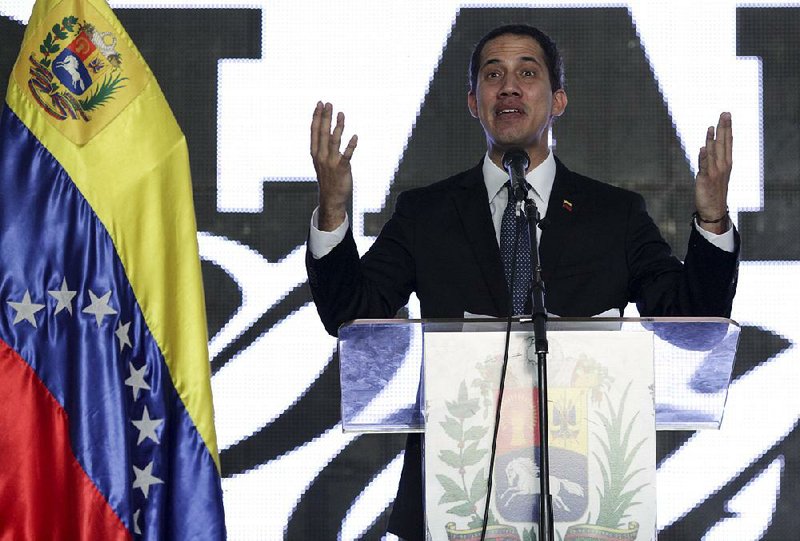CARACAS, Venezuela -- The Venezuelan government on Thursday said it has barred opposition leader Juan Guaido from holding public office for 15 years, though the National Assembly leader responded soon afterward that he would continue his campaign to oust President Nicolas Maduro.
The announcement by state comptroller Elvis Amoroso, a close ally of Maduro, cited alleged irregularities in the financial records of Guaido and reflected a tightening of government pressure on an opposition movement backed by the United States and dozens of other countries.
"We're going to continue in the streets," Guaido said soon after Amoroso's statements on state television.
The power struggle between Maduro and Guaido has intensified the sense of crisis in Venezuela, which suffered its worst blackouts earlier this month and then another round of power failures that paralyzed commerce this week.
Both the opposition and the government plan demonstrations on Saturday as they try to project resolve in a debilitating standoff in what was once one of Latin America's wealthiest countries. More than 3 million Venezuelans have left the country in recent years, escaping dire economic conditions that left many without adequate food or medicine.
Maduro, who is backed by Russia, says he is the target of a U.S.-led coup plot.
Venezuelan authorities this month arrested Guaido's chief of staff, Roberto Marrero, and accused him of involvement in a "terrorist" scheme to overthrow the government.
The United States was the first nation to recognize Guaido as interim president, asserting that Maduro's re-election last year was illegitimate. It has stepped up sanctions and other diplomatic measures in the hopes of forcing him to give up power.
Separately, Russia defended its deployment of military servicemen to Venezuela a day after U.S. President Donald Trump called on Moscow to "get out" of the Latin American country.
Russia "is not threatening anyone," and its increased military presence in Venezuela does not change the balance of forces there, Foreign Ministry spokesman Maria Zakharova said at a televised press briefing. The servicemen were sent as part of Russia's agreements to supply weapons to Venezuela and will stay as long as needed, she said.
Russian troops won't participate in any military operations, the official Tass news agency quoted Rafael Perez, a Venezuelan envoy in Moscow, as saying Thursday.
Tensions between the U.S. and Russia escalated over the weekend when a Russian Il-62 passenger jet and an An-124 military cargo plane carrying troops and equipment arrived at the international airport outside Caracas on Saturday. While the U.S. is trying to pressure Maduro to step down, Russia has continued to cultivate ties to the regime.
At a White House meeting Wednesday, Trump said Russia "needs to get out" of Venezuela. Moments before Trump spoke, Vice President Mike Pence called on Russian President Vladimir Putin to cease talks with Maduro and said Russia's military move was "an unwelcome provocation."
A Venezuelan Information Ministry official, speaking on the condition of anonymity because he isn't authorized to comment publicly, said the visit was to perform maintenance on Russian military equipment the nation had purchased.
Zakharova accused the U.S. of planning to use the island of Curacao as a base to intervene militarily in Venezuela under the guise of humanitarian aid. Russia delivered another shipment of civilian assistance to Venezuela this week, she said.
Information for this article was contributed by staff members of The Associated Press; and by Stepan Kravchenko and Henry Meyer of Bloomberg News.
A Section on 03/29/2019
